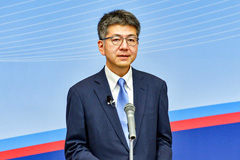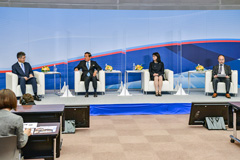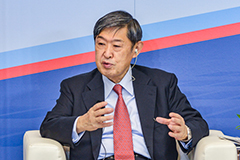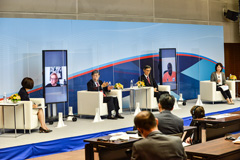Human Security in the COVID-19 Era: Memorial Symposium Held for the Late Ogata Sadako
2020.12.01
On Nov. 2, 2020, the Memorial Symposium for the Late Ogata Sadako was held with the title “Embracing Human Security in Meeting Global Challenges in the COVID-19/Post-COVID-19 Era.” Over 1,200 audience members participated in this event, which was held online on the occasion of the first anniversary of her passing.
In his opening remarks, Takahara Akio, director of JICA Ogata Sadako Research Institute for Peace and Development (JICA Ogata Research Institute), said, “Mme. Ogata was a strong advocate of human security. With global threats, such as violent conflicts, climate change, the proliferation of weapons and drugs, and terrorism, it is now difficult for a country alone to ensure individuals' security. The spread of COVID-19 has had an impact on the health and economic activities of people around the world, regardless of age, sex, income, ethnic group, or locality. International cooperation on the basis of human security has become more critical than ever before.”

Takahara Akio, director of JICA Ogata Sadako Research Institute for Peace and Development, gives his opening remarks
Session 1 looked back on the achievements and legacies of Ogata. First, in a video message, António Guterres, secretary-general of the United Nations, said, “Ms. Ogata was fearless in standing up for people, for humanitarian actions, and for political solutions to conflicts. As we face the COVID-19 pandemic, Sadako Ogata’s strength, her principles, and her values have lessons for us all.” Filippo Grandi, the United Nations high commissioner for Refugees (UNHCR), who worked with Ogata, commented in a video message that Ogata was ahead of the times and understood that all elements of the international response to crisis, such as political, human rights, humanitarian, and development members, must work closely together for those crises to be addressed in an effective and sustainable manner. “This is the crux of the human security approach that she championed decades ago. It took more than 20 years for this to translate into mainstream aid discussions and initiatives,” he said.
Next, Sasae Kenichiro, president of Japan Institute of International Affairs, took the stage. He shared memories of his time serving as Ogata’s aide at the UNHCR, recalling, “Mme. Ogata exhibited leadership backed by hard work. She was bold and creative, refusing to be held back by precedent. In taking on challenges, she always looked for their root causes.” In one example of her leadership, he said, she pushed to change the global rule so that internally displaced persons—who were previously outside the scope of protection ineligible—could receive international aid within their own country.
The theme of Session 2 was “The late Mme. Ogata and Japan – How has Japan’s international cooperation changed with the introduction of the concept of Human Security?” This session consisted of a panel discussion, moderated by Director Takahara. The three panelists were Takasu Yukio, president of the NPO "Human Security" Forum and special advisor to the Secretary-General of the United Nations on Human Security; Osa Yukie, president of the Association for Aid and Relief, Japan and vice president at Rikkyo University; and Makino Koji, director general of JICA’s Economic Development Department. The panelists discussed the impact Ogata had on them and the importance of focusing on human security in the midst of the COVID-19 crisis.

Panelists look back on the legacies of Ogata Sadako and the history of Japan's development cooperation
Takasu shared an episode from when he recommended Ogata as the next UN High Commissioner for Refugees and co-chair of the Commission on Human Security. He also introduced debates stemming from the differences in the approaches to humanitarian support and development cooperation between Ogata and Amartya Sen, who also served as a chair. “Mme. Ogata,” he said, “defined human security as protection and empowerment, and she was at the forefront, listening to those affected. She played an important role in building the backbone of Japan’s international cooperation.” Osa said, “One thing that Mme. Ogata said that made a big impression on me was that, ‘Living up to one's responsibilities to the international community in dealing with humanitarian crises is human instinct and common sense.’ Unlike the conventional national government’s approach to human security, she argued that protection of the diverse types of safety required collaboration between diverse actors. This helped boost the recognition of NGOs as actors in Japan’s international cooperation.” Makino, who served as the head of the human security promotion team at JICA since Ogata was appointed President of JICA, reflected, “She often said that human security was all about implementation, so don’t just sit around discussing things, but take action. JICA came to actively play a part in the peacebuilding field, and took a field-focused approach, where decisions weren’t merely made in the Tokyo head office, but instead authority was transferred to overseas offices. The mindset of the JICA staff also changed, and they came to take the position that even if risk is involved, in crisis situations, JICA needs to offer support. This doctrine continues to be the heart and soul of JICA in dealing with COVID-19.”
In a video message from overseas, Mohammad Ashraf Ghani, president of the Islamic Republic of Afghanistan, said, “Madam Ogata was wise, embodying a unique combination of charisma, compassion, conviction, courage and courtesy.” Isidro L. Purisima, deputy presidential adviser on the Peace Process-Operations for the government of the Philippines, said, “Her contributions as JICA president, particularly in our country, were instrumental in moving the Bangsamoro peace process forward.” Ahod "Al Haj Murad" Ebrahim, chief minister of Bangsamoro Transition Authority, discussed how, since Ogata visited the island of Mindanao in September 2006, JICA has played an indispensable role in the Bangsamoro peace process. Promoting human security, he continued, meant transforming the entire Bangsamoro region, which was the upper vision of the peace process.
Session 3, whose theme was “Revisiting Human Security in the COVID-19/Post-COVID-19 Era (Human Security 2.0) and Cooperation in Global Health,” began with a speech by JICA’s President Kitaoka Shinichi. He pointed out the roles that should be played by Japan in international cooperation in the face of the threats posed by violent conflict, climate change, expansionism, the mounting problems resulting from the COVID-19 pandemic, and the insufficient response by the international community to them. He stated, “At the 7th Tokyo International Conference on African Development, held in 2019, JICA advocated human security for our modern era (human security 2.0), based on a recognition of the importance of addressing the threats that society faces, which are constantly changing with the times. JICA will lead the international community in promoting measures that combine prevention, caution, and treatment to deal with the global issue of COVID-19.”

JICA’s President Kitaoka Shinichi points out the roles that should be played by Japan in international cooperation
There was then a panel discussion between President Kitaoka, Omi Shigeru, chair of a government subcommittee on COVID-19 measures, and Machii Eri, chairperson of the NPO AfriMedico, who took part in person, and Susanna Moorehead, chair of the OECD’s Development Assistance Committee (DAC) and Muwanga Moses, director of the Entebbe Regional Referral Hospital in the Republic of Uganda, who took part remotely. The panel discussion was moderated by Doden Aiko, senior director of NHK World.
Omi stated, “In infectious disease countermeasures, what are important are preparing before the disease begins spreading and then taking initial action during the early stages of the infectious spread. COVID-19 has become rampant in developing countries, but the actual situation is unclear. Developing countries face the problem of growing disparity in access to medical treatment.” Moses discussed the situation in the medical field in Uganda and the country’s COVID-19 countermeasures. He explained that due to shortages of various resources, such as medical facilities and medical equipment, healthcare facilities have no choice but to temporarily stop dealing with other diseases, such as malaria, so they can deal with the COVID-19 situation. According to Machii, who is working in Tanzania to spread a Japanese business model of “the use-first-pay-later-drug set ‘okigusuri,’” which are stored at home for emergency use and distributed by household distributors, “It’s not just a matter of delivering drug. Instead, what truly contributes to infection countermeasures is working with health workers in different regions and raising awareness about the importance of diagnosis and health examinations, providing residents with accurate medical knowledge.” Moorehead explained that she considered the three main threats to human security to be vulnerability caused by poverty and conflict, inequality, particularly inequality between men and women, and climate change. She said that all parties, including the private sector, must cooperate with each other.
Saraya Yusuke, president of SARAYA Co., Ltd., a hygienic product manufacturer that is promoting greater use of disinfectant in Uganda, delivered a video message, in which he said, “In order to address the issues of nationalism and inequality, which have grown as the result of the COVID-19 pandemic, it is essential that we implement the sustainable development goal (SDG) of 'leaving no one behind,' which was also Mme. Ogata’s mission. I hope that we can all work to this end from our own positions.”
Many questions were fielded from participants, and the discussion covered a wide range of topics, such as how to collaborate in developing countries in the midst of the COVID-19 pandemic, which has made on-site visits difficult, how to develop people who can play an active role in the international community, the roles to be played by Japan and JICA, and challenges faced in implementing SDGs.

The panelists discuss efforts against global health threats in the Post-COVID world
To sum up the discussion made in the session, President Kitaoka shared the message that, “It is important that we develop the concepts of human security and the methods used to realize it in line with the changing threats that face the world, such as COVID-19. In order to produce people like Mme. Ogata, who was an important part of the international community, it is vital that we cultivate our ability to put ourselves in other shoes and think about what we would do.”
In closing, Muto Megumi, deputy director of JICA Ogata Research Institute, brought the symposium to an end, exhorting all to carry on the spirit of Ogata, and sow the seeds of a better future in whatever ways they can.
This symposium was featured in NHK WORLD JAPAN program “Human Security in the COVID19 Era -OGATA Sadako Memorial Symposium-.” Streaming is available at the link below.
Memorial Symposium for the Late Ogata Sadako (Condensed Version) (November 2020)

事業事前評価表(地球規模課題対応国際科学技術協力(SATREPS)).国際協力機構 地球環境部 . 防災第一チーム. 1.案件名.国 名: フィリピン共和国.

事業事前評価表(地球規模課題対応国際科学技術協力(SATREPS)).国際協力機構 地球環境部 . 防災第一チーム. 1.案件名.国 名: フィリピン共和国.

事業事前評価表(地球規模課題対応国際科学技術協力(SATREPS)).国際協力機構 地球環境部 . 防災第一チーム. 1.案件名.国 名: フィリピン共和国.

事業事前評価表(地球規模課題対応国際科学技術協力(SATREPS)).国際協力機構 地球環境部 . 防災第一チーム. 1.案件名.国 名: フィリピン共和国.

事業事前評価表(地球規模課題対応国際科学技術協力(SATREPS)).国際協力機構 地球環境部 . 防災第一チーム. 1.案件名.国 名: フィリピン共和国.
scroll